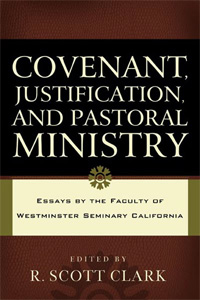As Michael Horton acknowledges in his work on covenant theology, one of the more difficult issues in covenant theology is how to relate the Mosaic Covenant to the earlier Abrahamic Covenant and the New Covenant. Complicating matters is the old Dispensational doctrine . . . Continue reading →
Covenant, Justification, and Pastoral Ministry
When Is a Church Not a Church?
I was searching for something the other day and ran across chapter 18 of the Scots Confession (1560) which speaks to the “Notes” (from the Latin, nota or “mark” or “indicator”) of the True Kirk (church). Ordinarily, when I think of the . . . Continue reading →
Faith Formed By Love Or Faith Alone? The Instrument Of Justification
In his discussion of works, Calvin anticipates the great error of many contemporary critics of the Reformation doctrine. They think that as long as they say that salvation is by grace alone they have said all they need to say theologically, but many medieval theologians said exactly that. They taught that grace alone worked to transform and sanctify the life and that all the works of the Christian are the fruit of grace. Such an improved life, however, is still an imperfect life and cannot stand in the judgment. Calvin summarizes the situation succinctly: “If righteousness is revealed in the gospel, surely no mutilated or half righteousness but a full and perfect righteousness is contained there. The law therefore has no place in it” (Institutes 3.11.19). What one needs to stand in the judgment, Calvin declares over and over again, is a perfect righteousness. No matter how much progress one makes in grace during this life, so that one’s life becomes holier, holier, and holier, it will never get to the point where it will be able to stand in the judgment. Continue reading →
Does Covenant Theology Change Our Doctrine Of Predestination?
HB reader Keith asks, Succinctly, what is covenant theology on the following: Predestination Security of the believer? Hi Keith, The short answer is that the covenant theology that we confess does not fundamentally change our doctrine of predestination, which says that all . . . Continue reading →
Theological Error Seeps In
Years ago, in the second house in which Mrs Heidelblog and I lived, water seeped into the basement every time it rained and it rained frequently. As the ground became soaked water would push in and up through the basement. We had . . . Continue reading →
Does Baptism Save?
Merrit asks this question. “Two friends and I have been talking about this verse (1 Peter 3:21) and passage for quite some time today. The more we seem to talk about it the more confused I seem to get about it.” Merritt, . . . Continue reading →
Faith Alone Is The Instrument Of Justification AND Salvation
Controversy can be ugly and painful and the recent controversy over sanctification has been both at times. It can also be helpful by bringing greater clarity and this controversy has been useful in that respect. Some orthodox Reformed pastors are being charged . . . Continue reading →
ReformedCast: On The Distinction Between The Law And The Gospel
Thanks to Scott Oakland for inviting me to do episode 145 of the ReformedCast. We talked about the distinction between law and gospel. Scott asked good questions and we were able to cover a lot of what is currently being discussed now: . . . Continue reading →
"Sola Fides" is not Sola Fide
I’m reading Rowan Williams on Arius. Early in the book he uses the expression “sola fides.” In context, he seems to be making an indirect reference to the Protestant doctrine of sola fide. I’ve seen this in other writers. When I first noticed . . . Continue reading →
A Form For Penitent Ex-Federal Visionaries
To all whom this these presents do come, I hereby declare that I really and heartily believe in form and substance what the Reformed churches confess, that God declares sinners righteous sola gratia, sola fide, only on the ground of the imputation . . . Continue reading →
For Those Just Tuning In: What Is The Federal Vision?
In talk radio, the host is supposed to “reset” the show at regular intervals. He is to remind listeners of which show they are listening to and on what network or station. One reason why the host does this is that some . . . Continue reading →
If You’re Waiting To Order Your Copy… (Updated)
If you’ve been thinking about ordering CJPM but have been waiting, the window of opportunity to get your copy is closing. The WSC Bookstore is out and they were told by P&R that the book is out of print. Amazon still has . . . Continue reading →
Covenant Theology Is Not Replacement Theology
Recently I had a question asking whether “covenant theology” is so-called “replacement theology.” Those dispensational critics of Reformed covenant theology who accuse it of teaching that the New Covenant church has “replaced” Israel do not understand historic Reformed covenant theology. They are imputing . . . Continue reading →
Should Reformed Theology Move Beyond Covenant Theology?
I. SUMMARY In a post (HT: Aquila Report) dated Friday 9 August, Bill Evans raises the question whether there is in Reformed theology what he calls “pervasive covenantalism” or an over emphasis or imbalanced emphasis in Reformed theology on covenant. He points to . . . Continue reading →
What About Noah and Covenant Theology?
Taylor asks the question on the PB. My reply below: There are resources on covenant theology here. I would especially encourage you to read this collection of quotations from older writers on CT. There is a brief history here. My own views . . . Continue reading →
Three Ways of Relating to the One Covenant of Grace
At the PB the question was asked: We know that there are at least two categories of people within Scripture, the elect, and the non-elect. However, it might be apparent that there is a third class of people, those who have taken . . . Continue reading →
Resources For Those Beginning To Study Covenant Theology
For those just getting started in covenant theology I recommend: R. Scott Clark, “A Brief History of Covenant Theology.” Audio: What Is Covenant Theology And What Are The Implications For The Church And Family? Mike Brown and Zach Keele, Sacred Bond: Covenant Theology . . . Continue reading →
Is Faith a Work?
The question comes (paraphrasing): Since Scripture says, “believe,” (e.g. Acts 16:31) it seems that we are commanded to believe. If the command to believe is an imperative and an imperative is “law,” and if the answer to the command “believe” is faith, . . . Continue reading →
Finals and the Covenant of Works
It’s the season for final exams at Westminster Seminary California. I always get a little nervous during a final, even though I’m the one giving it and not the one taking it. Naturally I want the students to do well but by the . . . Continue reading →
The Grace Of Law?
An HB Classic
The question comes: I once heard someone say (or write) that the Law was also “graceful” because at least in this God’s case, He was letting His subjects know what was expected and wanted from them. I appreciate the intent of the . . . Continue reading →
















